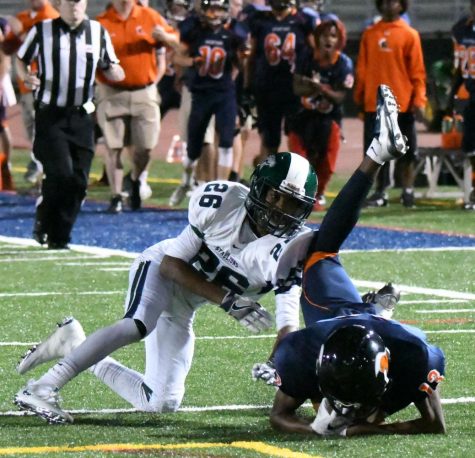In memoriam: Ron Maggiano
When Ronald Maggiano stood in front of his first classroom full of high school students, the year was 1979. The Iran hostage crisis was still months away, and Ronald Reagan had yet to announce himself as a presidential candidate.
Ron Maggiano – better known as “Mr. Magg” to his students – lived through much of the modern history he was so passionate about teaching. He spent 33 years at the front of a classroom, first as a music teacher and then, for 25 years, as a teacher of a wide range of history courses. Here at WS, he taught European, US and World history courses, as well as AP Government.
Maggiano passed away unexpectedly at Fairfax Hospital on Monday, May 19th, after complications during his battle with cancer. He is survived by his wife, Laurie, and two sons, Grey and Chase.
He taught at West Springfield for 19 years, joining the staff in 1994 and immediately getting noticed for his sense of humor and musical talent. For many teachers, it was his guitar skills that first caught their attention.
“We were in the cafeteria, and there was this guy up front, and he was singing this song… Everyone was listening, and laughing. It was really, really funny. And I remember thinking, ‘If this is what this school is like, I picked the right place. This is awesome,’” said English teacher Holli Wolter, describing the first time she saw Maggiano.
Mr. Magg was well-known for his songs, which he composed himself and used not only for comic relief but also as a teaching tool. He wrote “The Ballad of Martin Luther” during his time teaching AP European history, explaining in hilarious, yet accurate detail Luther’s quest to reform the Church.
“Indulgences, indulgences, thou shalt not sell those indulgences!” he belted out year after year, perched on his stool and strumming his guitar with enthusiasm. No student of his was likely to forget that Johann Tetzel “sold indulgences like they were pretzels”.
“As long as I can remember, Mr. Magg taught AP European history, and he taught that course with such passion, and such charisma, that everyone who had him wanted to stay in touch with him,” said assistant principal Becky Brandt, who worked with Maggiano her entire time at WS.
Hundreds of his former students reconnected with him through Facebook after high school, where he offered them life advice and the occasional quote from Star Trek (his favorite TV show). Following his passing, those students rushed to post on his wall, describing his class and his impact on their lives.
“You had us all in your corner, cheering for Kirk and Spock to survive the Wild West or Indiana Jones to beat the Nazis,” read one post from former student and WS alum Ben Trump. “You made learning history fun.”
But some of his alumni got the opportunity to do even more than reconnect over social media. Chris Pellegrini had Mr. Magg as his AP Euro teacher his senior year, in 2001, only to return after college to teach in the Special Ed department at WS.
“It was one of the best classes I took in high school,” said Pellegrini. “I legitimately enjoyed going to that class every single time.”
Pellegrini remembers Mr. Magg starting each class with “anonymous index cards”. He would give his students a random prompt, and it was their job to respond to it on 3×5 cards, which he would then read out loud, to the entertainment of his class. The topics were rarely serious, or even necessarily related to European history. It was with activities like this that Maggiano kept his students engaged and on their toes, even as he covered a topic spanning all of Europe for the past five hundred years.
“I think that he was a great example of trying to engage you and make it fun,” said Pellegrini. “And if you succeed at that, you must be doing something right.”
From goofy movies to enthusiastic guitar solos, former students remember him as a teacher who left no stone unturned in the name of education. His creative style endeared him to the thousands of students he taught over the years.
“Every day was different. He would always make it light,” said senior Brett Smith, a former student of Mr. Magg. “His teaching was just amazing… you wanted to learn in his class.”
His style within the classroom also got him a reputation outside of it. When Human Geography teacher Brad Swain first met Maggiano in 2005, it was as a guest speaker at American University, where Swain was a student. The topic, like his teaching style, was a little off-beat.
“Using Star Trek in the classroom: innovative ways to teach,” said Swain, remembering the topic Magg had chosen to speak on the first time they met. “The very first impression I had of Magg was a guy who cared very much about his students and very much about his classroom.”
But Mr. Maggiano was more than a teacher during his time at WS. He was one of the leaders of an award-winning history department, one that over the years earned a reputation for excellence in all the courses it taught. Maggiano himself won the Disney Teacher Award for innovation and creativity in 2005, and the American Historical Association’s Beveridge Family Teaching Prize for outstanding K-12 teaching the following year.
“They were the flagship department of our school,” said Pellegrini, remembering his own time as a student at WS. “The reputation of the program and the awards they were receiving… I think our school was very proud of that department. Everyone enjoyed their history experience at the school.”
Pellegrini remembers Mr. Magg as one of the integral members of a department that made its students not just learn, but love, history. He was famous within the school for his ability to take even the driest chapters of the textbook and make them interesting, engaging and worth learning about.
But even after nearly two decades of award-winning teaching at WS, Maggiano was always humble. Last year, when a new teacher showed up in the department and they were short a classroom, Mr. Magg was the first to volunteer his to the cause. Without complaint, Maggiano spent his last year here at WS with a cart instead of a class, carrying all his materials between rooms that had free periods. Protocol may have dictated it should be the new teacher with that job, but for Mr. Magg, even after 33 years in the business, protocol never took precedence over generosity.
But generous deeds were not just one-time acts for Maggiano; they were a way of being. He gained fame among his students for his inexhaustible supply of Starbursts, which became a staple food group for many of them (and the occasional freeloader passing his classroom in the hallway).
“I was with [my friend, junior] John Giordano, and he had to turn something in. And I saw his Starbursts and said ‘Hey Mr. Magg, I don’t have your class, but can I have your Starbursts?’. And he said ‘sure’,” said junior Jonathan Tran, remembering the first time he met Maggiano.
Tran, who never had Mr. Magg as a teacher, nonetheless paid him an estimated 50 or so visits from then on, both to get candy and to discuss coffee, school, and other bits of day-to-day life. It was in little ways like this that he managed to touch the lives of so many members of WS, even those he didn’t teach.
“Everyone knew him, everyone knew who he was,” said Wolter.
He was well-known as a man who was slow to anger and quick to forgive, but there is one issue everyone knew he had strong opinions about. When he decided to retire last year, he did so out of frustration with an education system that he felt valued test scores over meaningful learning. In an interview with The Oracle last May, he called the current system “assembly line education” and strongly criticized the trend of teaching to the test, which he felt was resulting, at best, in students graduating with plenty of information in their heads, but no idea what to do with it.
“Life is not a multiple choice question, and the answer to life’s most important questions is not A, B, C or D,” said Maggiano in his last interview with The Oracle.
The decision to retire was not an easy one. It took Maggiano two years to decide that his own philosophy on education was incompatible with the one being implemented at the national level. His retirement came just four years before he would have reached full retirement.
“He was a guy who lived his beliefs. He wasn’t going to be knocked off,” said Brandt.
Maggiano was hardly the only teacher to oppose the recent change in the direction of the education system. But he was one of the few who was never afraid to speak his mind, even before he retired. He disagreed with standardized testing from the day the first SOLs were rolled out in 1998, and his retirement was ultimately the result of seeing his own concerns ignored as SOL and AP test scores became more and more emphasized in the education system.
“Mr. Magg was adamant that the whole testing paradigm was not just wrong but immoral… He was not afraid to speak his mind when others around him were,” said Jim Percoco, a former Social Studies teacher at WS who retired two years ago. “This was a consistent theme with him… Magg cared about kids in a genuine way.”
Despite his issues with the system, he kept an open mind, and never ruled out the possibility of returning to teaching. He didn’t see the decline that he perceived in education as inevitable. He remained optimistic that a style of teaching that prioritized making students think over making them memorize would one day become the norm again. And even as his dissatisfaction with the education system grew, his love for his students and his school never changed. He commuted over an hour from Middleburg every day to get to WS, and he always considered the drive to be worth every minute.
Within the Social Studies department, he was known as a teacher first and a lover of Starbucks second. In the mornings he was rarely, if ever, found without a vanilla latté in his hand. Maggiano was such a regular at the West Springfield Starbucks that the baristas would have his latté waiting for him every morning before he showed up. And he wasn’t the type to do anything without sharing.
“The amount of Starbucks he bought for the staff would keep that place in business,” said Swain.
Of course, coffee was but one example of Mr. Magg’s constant, endearing barrage of generosity. His colleagues and students alike remember how instinctively warm and friendly he was. When math teacher Wolcott Baird was working (ultimately unsuccessfully) to re-start the AP European History class last spring after a yearlong hiatus, he experienced that friendliness first-hand. Maggiano was eager to share not only his time, but also the immense wealth of material he had accumulated over the years for the AP Euro course, even though he was busy at the time with over a hundred of his own students in AP World.
“He gave me tons of resources. I mean, he had more materials than I knew what to do with,” said Baird.
Baird remembers not just that generosity, but also his love of history, which rubbed off on everyone around him. Students would talk about Maggiano in other classes, and the reviews were always positive.
“Being a history guy, a history major, and not really teaching history, it was good to know kids were having a good history experience here,” said Baird.
It was a good experience at least in part because Maggiano was so willing to confront problems with a sense of humor. Even last year, after over three decades of teaching, he was able to stare down a mountain of late work from his slacking AP World History students at the end of second quarter, make a joke to the class, and tell them to shape up with a laugh.
“He always found something funny,” said World History teacher Cathleen Boivin. “I think he saw life that way too. He was good at not taking himself too seriously.”
Humor was a staple of his life and his teaching, but underneath it lay a person who cared deeply about his job and the people around him.
“He’d bring bagels for the department, about once a month,” said Social Studies Department Chair Brian Plancich. “More than anything, he just cared about people. You don’t always meet people like that.”
For many, because of that personality, history was just one part of what he taught. More than medieval battles or Renaissance philosophers, Ron Maggiano taught about life. And that’s something that can only truly be taught by example.










